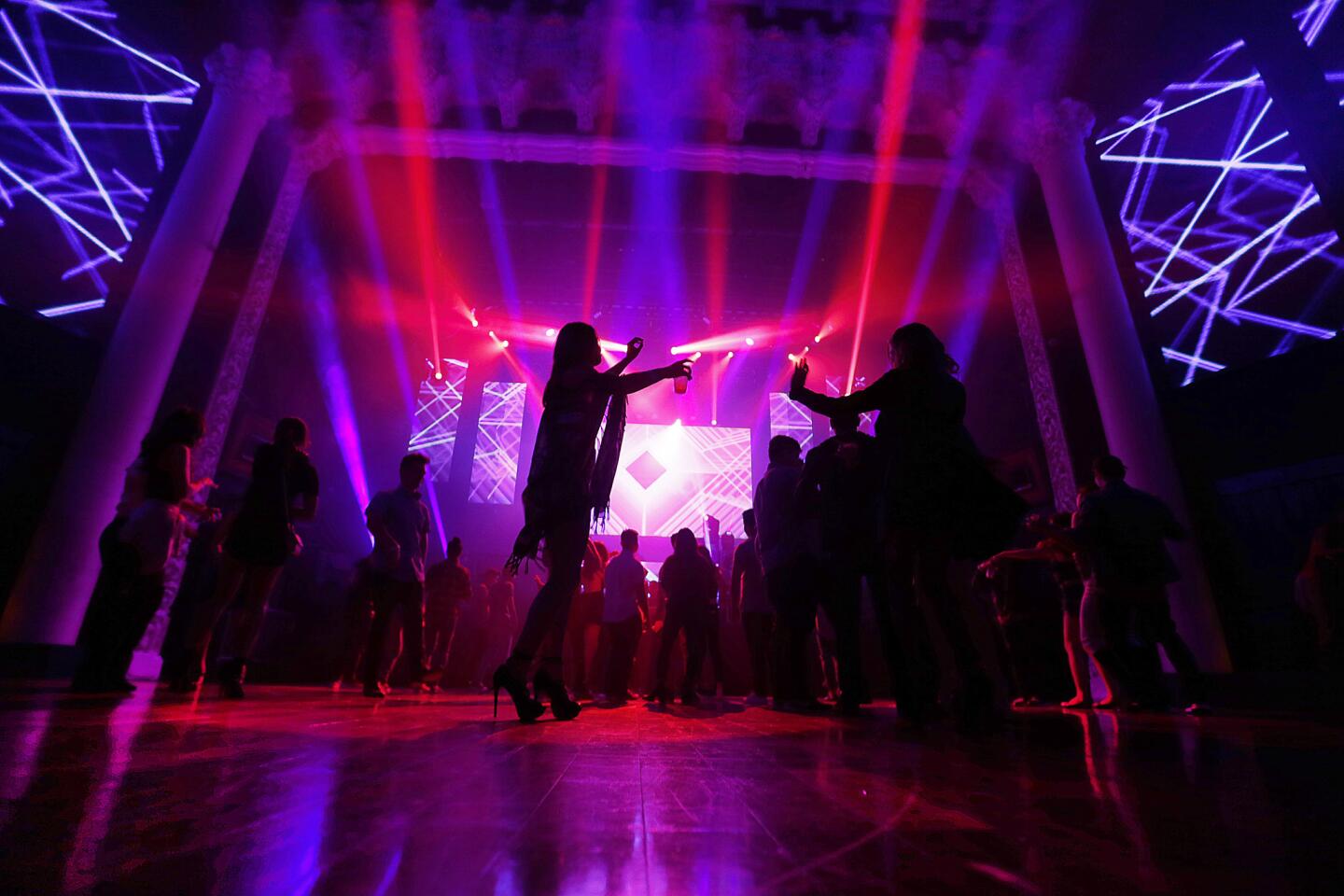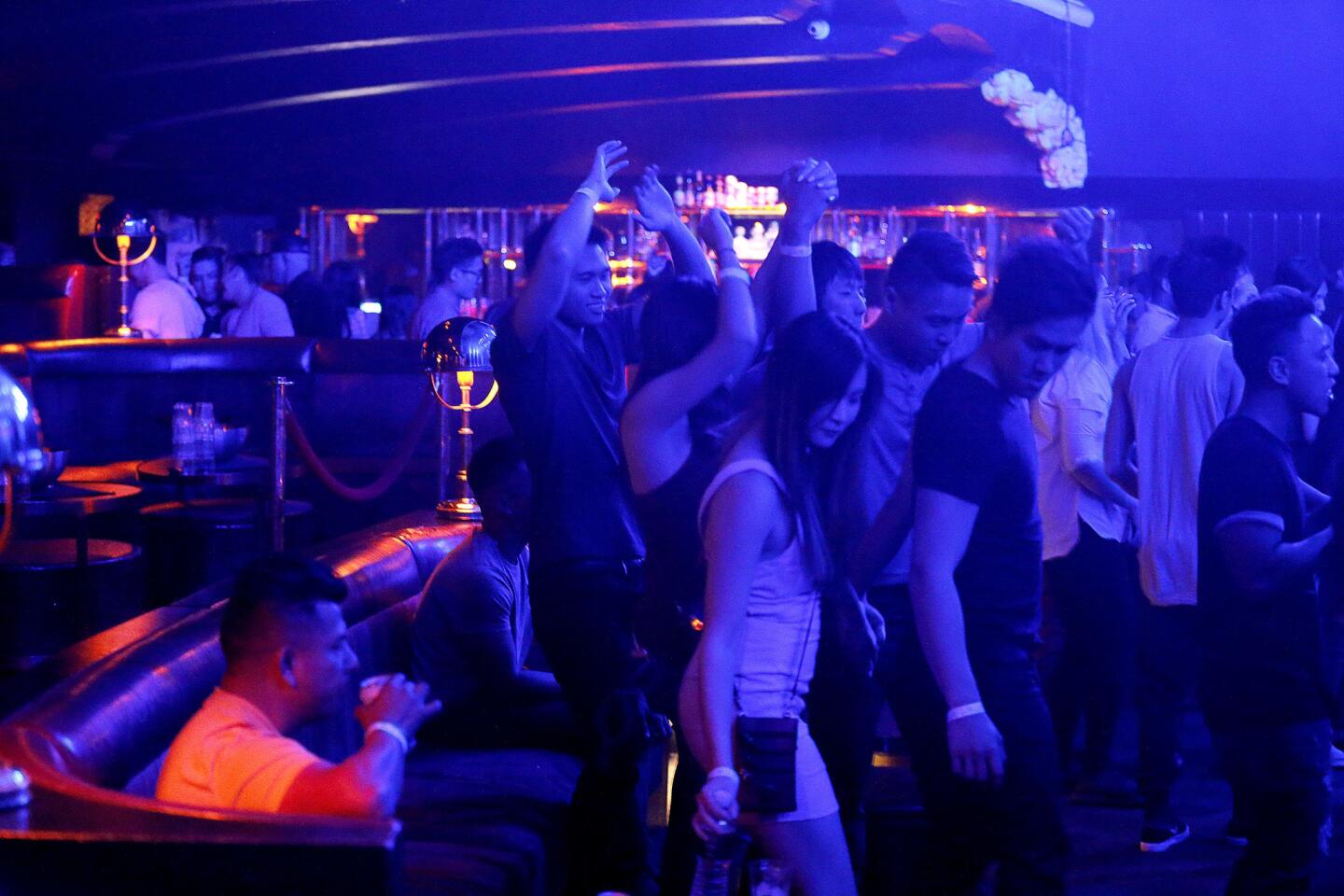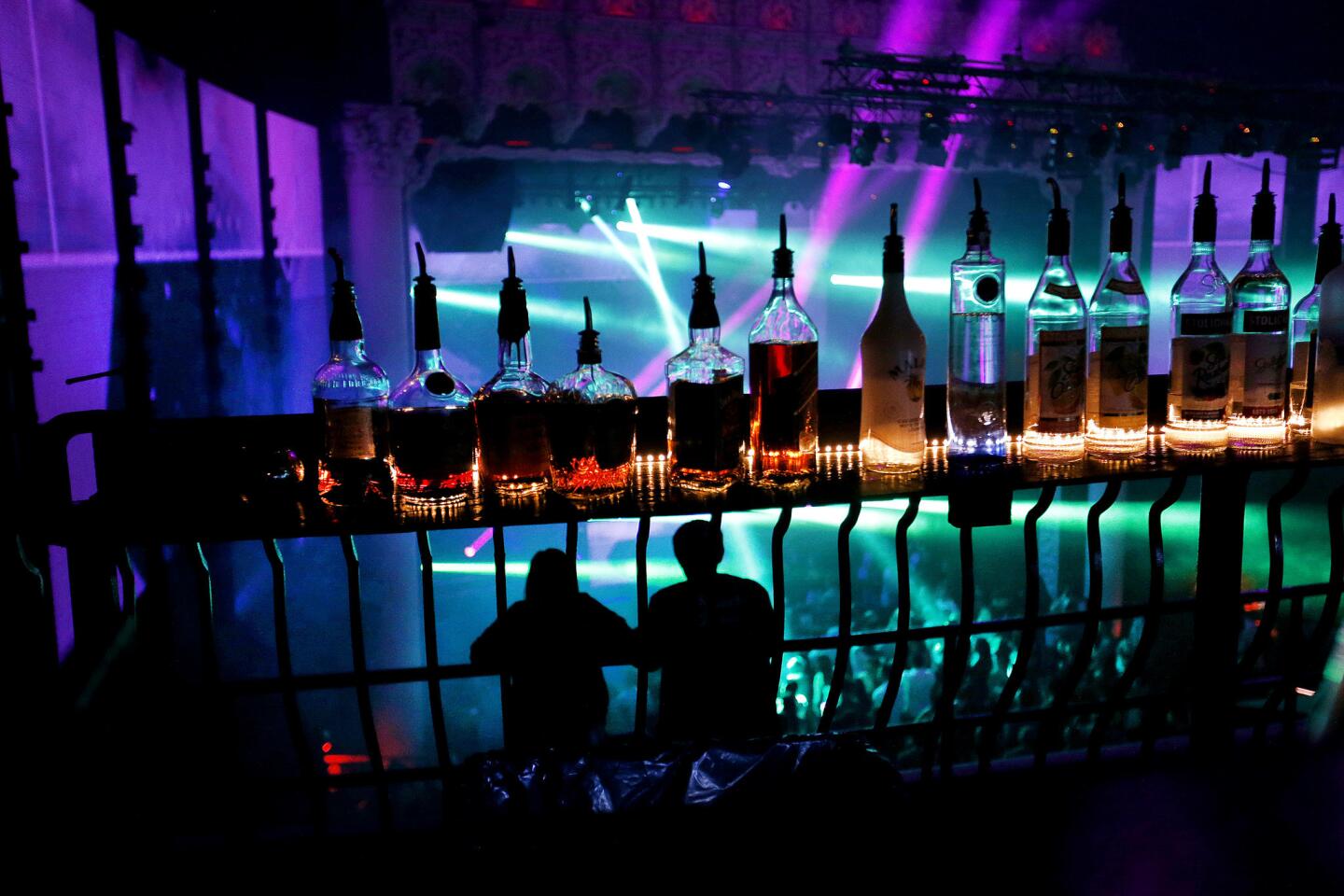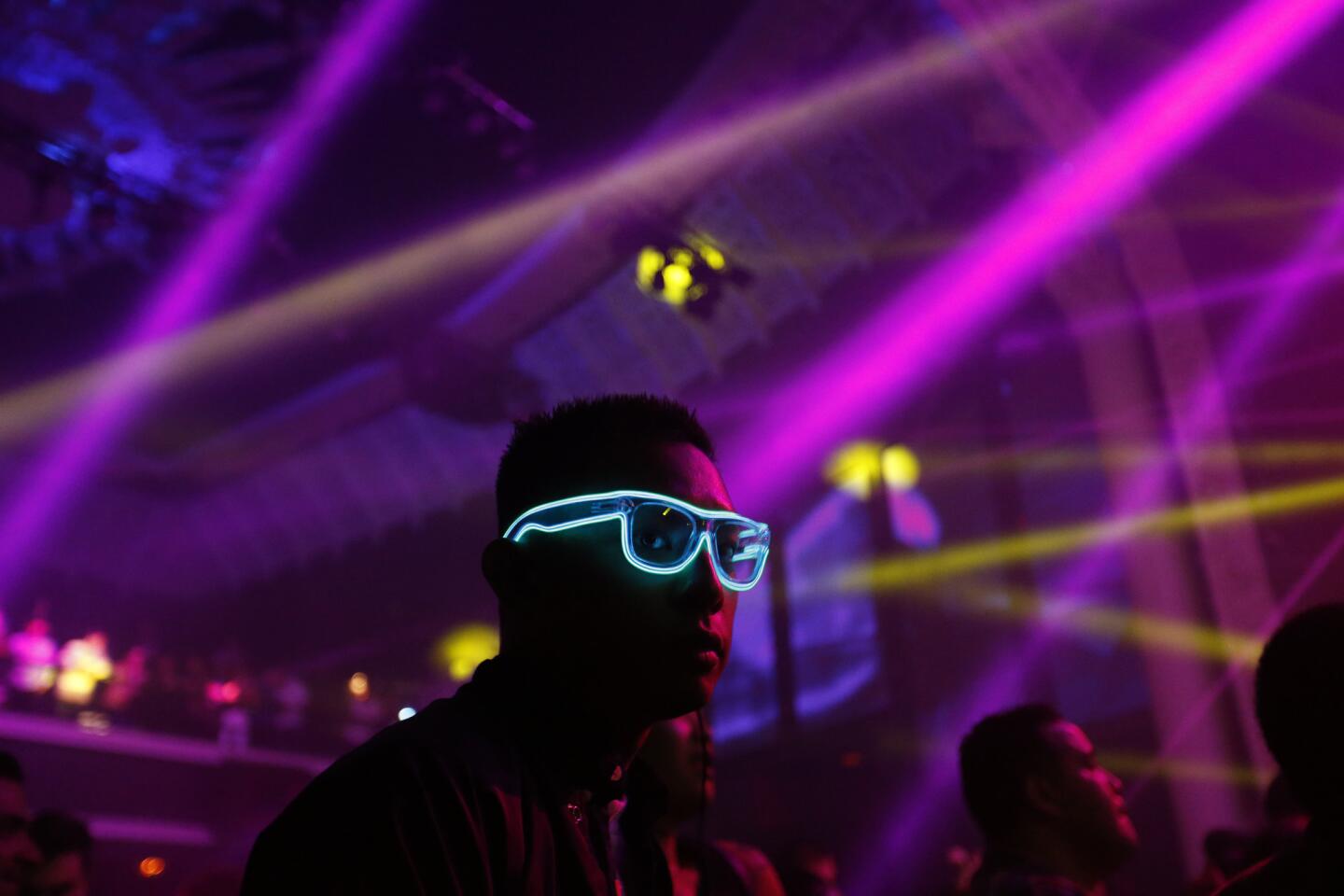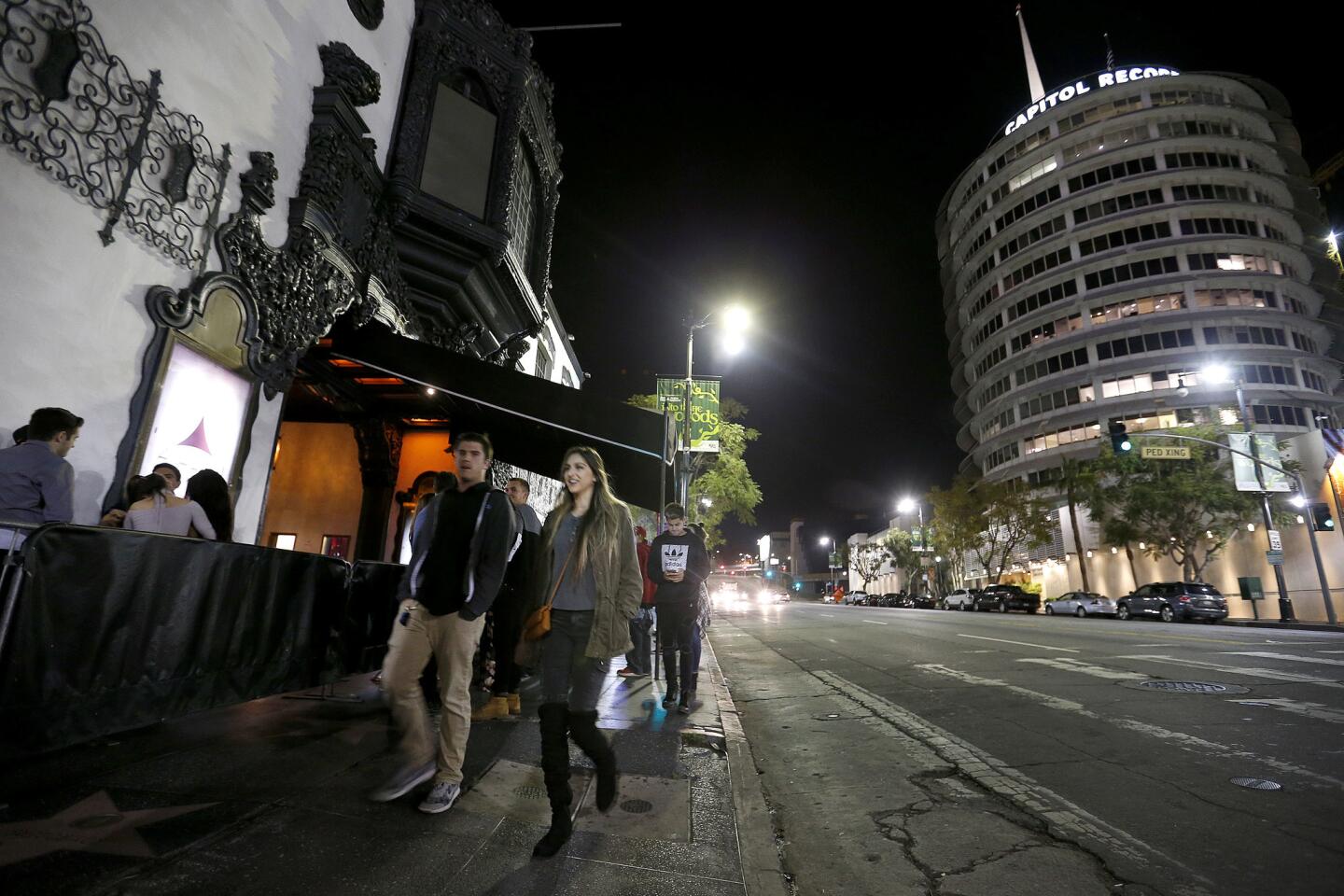Serving alcohol until 4 a.m. could be an answer for safer nightlife
- Share via
Late on a Saturday night, in a nightclub on the fringes of the Arts District, a few hundred music fans are dancing. Downtown hipsters, gay couples and techno scenesters all sway to jubilant electronic tracks or flirt on the outdoor smoking patio.
But when the clock strikes 2 a.m., the bar shuts down. A few grumbling patrons wonder where to go next. Contrail Storey, a jewelry designer who lives and works downtown, isn’t ready to head home yet. But he’s not crazy about the idea of tracking down an unpermitted (or possibly unsafe) warehouse party.
It would be much better, he says, if some L.A. bars could stay open later for “the people that want to stay out late but avoid having to go to some illicit after-hours venue.”
After last year’s fire at the Ghost Ship warehouse in Oakland killed dozens of young music fans, people in nightlife — musicians, club owners, civic leaders and patrons — have been looking for ways to prevent a another such tragedy.
Many, including state Sen. Scott Wiener, believe that one solution is to make later serving hours legal.
In February, Wiener (D-San Francisco) proposed the Let Our Communities Adjust Late Night Act (LOCAL), a bill that would allow municipalities to permit alcohol sales until 4 a.m. in some cases.
It is not a new idea; ever since 1935, when bars and clubs in California instituted a 2 a.m. last call, people have argued for the right to dance until dawn.
But it does have a new, powerful and historically counter-intuitive argument: Public safety.
LOCAL, which faces its first hearing at the Senate Public Safety Committee on March 28, is essentially a repeat of legislation proposed by state senator Mark Leno in 2013. Opposed by law enforcement and neighborhood groups who feared a later closing time would result in more drunk driving and disorderly behavior, that bill failed.
But along with the standard arguments about economic growth, Wiener and the bill’s supporters (which include Republican and Democratic state senators and assembly members) argue that extended service hours would make it more financially viable to operate fully-inspected and permitted music venue.
More important, that could help concert promoters — especially in underground scenes that cater to LGBT and minority fanbases — avoid ad hoc venues like Ghost Ship.
“If you’re too restrictive, you just drive venues underground,” Wiener said. “The reality of life is that you need to meet people where they are.”
“If dance clubs could keep their doors open till 4 a.m., it would provide our community with safe, regulated spaces,” said Mikey Lion, DJ and co-founder of the Desert Hearts festival, the 96-hour-long party in rural San Diego this month.
“What looks like a hedonistic all night party,” he added, “is actually an exercise in radical self expression and camaraderie
For some musicians and concert promoters, the proposed bill means that California is finally recognizing not just the risks but the potential of its nightlife scenes.
“Nightlife is a key petri dish for culture,” said Guy Gerber, an L.A.-based Israeli DJ. “Fashion, music, art all combine through nightlife, and often these combinations happen after 2 a.m.”
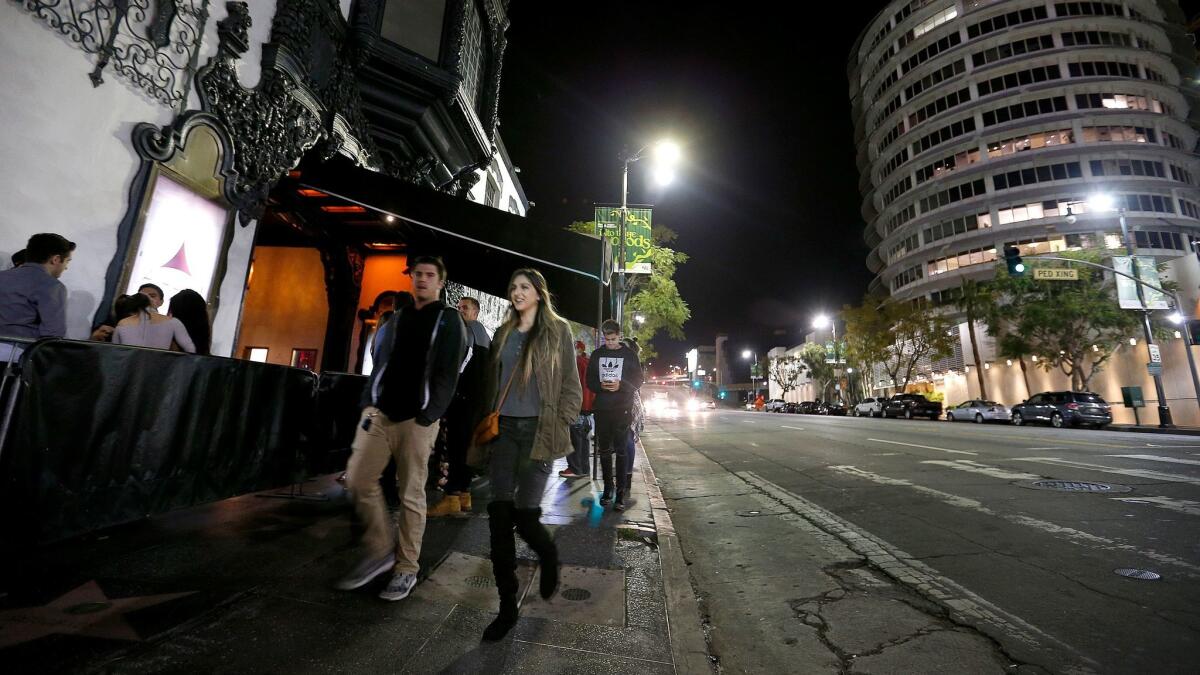
Gerber’s popular Rumors festival, featuring LGBT disco heroes DJ Harvey and the founders of A Club Called Rhonda, hits Chinatown this month. He calls L.A. the world’s entertainment capital, but adds that it has fallen behind other cities like Berlin, Amsterdam, New York and London. “Most cities in the world don’t have such strict rules,” he said, adding that he understood why promoters would consider going underground for such an event.
“When we were working to set up [the Rumors festival], we wanted to make sure we were compliant, but the process isn’t easy,” he said. “Many promoters and DJs are likely to be put off by this and simply DIY it — which isn’t a good alternative for the city, the fans or the event.”
For Wiener, the bill has personal ramifications as well. Going out to gay nightclubs was a formative experience for him. “Nightlife plays a critical role in what makes cities unique,” he said. “Especially for LGBT people, nightlife helped us find our community. It matters a lot.”
And though he stresses the safety element of the bill, Wiener also notes the economic gains later hours could provide.
“For years, nightlife was approached as a problem to be managed, but we’ve worked hard to change that narrative,” Wiener said. “It’s a $6-billion industry in San Francisco, and the nighttime economy supports hundreds of thousands of jobs that are accessible to people without a college degree. We should embrace that.”
Other American cities including New York, Miami, New Orleans and Chicago have long allowed for after-2 a.m. alcohol sales in certain clubs and neighborhoods.
“Downtown’s growing hospitality scene — including our sports venues and dining — have established DTLA as an entertainment destination that attracts people from around the region and the world,” said Jessica Lall, president and chief executive of the Central City Assn., a downtown L.A. business advocacy group. “Allowing venues with responsible operators to remain open later, if specific local conditions can be met, may add to the vibrancy of DTLA as a 24/7 community.”
Although there has been no organized opposition to LOCAL yet, past arguments against a 4 a.m. last call stressed the dangers of increased drunkenness, especially on the roads.
“The dangers would seem obvious in L.A.,” said Dr. Steven Sussman, a USC professor studying preventive medicine, psychology and social work. “For some people, they may use the time to sober up, walk home or make use of sober drivers. Others may drive drunk at 4 a.m. To permit the obvious means that there needs to be an infrastructure put in place to minimize harm.”
Popular ride-share services like Lyft and late-night Metro service may quell some of those fears. “As with any new policy that is being considered, we need a balanced approach,” Lall said. “As proposed, [the bill] appears to have many safeguards in place that take into account all the needs of downtown’s businesses and residents.”
The LOCAL bill requires communities pursuing extended service to get a law enforcement assessment of its impact, from noise levels to the potential for drunk driving, and prove support from residents.
After Ghost Ship, balancing the risks and benefits of nightlife may require a new approach.
Dave Dean is an owner of Lot 613, a fully permitted Arts District venue that hosts underground dance music events. Both 613 and Avalon, the Hollywood club where he also works, have licenses that allow for extended operating hours without alcohol sales.
He sees the push for 4 a.m. service as more than a cushion for his bottom line (which, he said, needs to accommodate rising wages and other costs). It’s also about shaping a preexisting interest in late-night clubbing to be safer, and using the revenue to improve city budgets and neighborhood life.
“If people are going to do this anyway, you might as well get it into a place that’s permitted,” Dean said. “If there’s an audience that would benefit and utilize this, it’s the underground dance audience. These people have been out before and have experience. It’s not about ‘We can drink until 4, let’s go crazy.’ You’re not going to create a whole new world because of 4 a.m.”
For breaking music news, follow @augustbrown on Twitter.
ALSO:
The L.A. DIY community contemplates a post-Ghost Ship life
‘No, take me seriously’: Meet the Regrettes and Cherry Glazerr, L.A.’s new faces of rock
For music’s ‘medical refugees,’ Obamacare is a lifeline worth protecting
